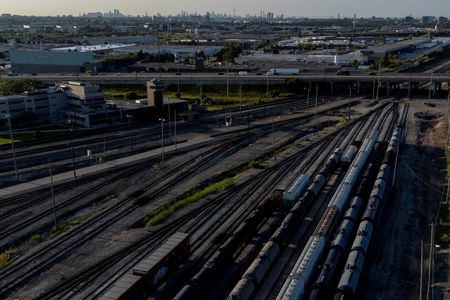By Allison Lampert, Abhinav Parmar, Jahnavi Nidumolu
(Reuters) -Canada’s top two railroads locked out more than 9,000 unionized workers, triggering an unprecedented rail stoppage that could cause billions of dollars worth of economic damage and roil North American supply chains.
The companies – Canadian National Railway (CN) and Canadian Pacific Kansas City (CPKC) – and the Teamsters union blamed each other for the work stoppage after multiple rounds of talks failed to yield a new agreement.
“Throughout this process, CN and CPKC have shown themselves willing to compromise rail safety and tear families apart to earn an extra buck,” Teamsters Canada Rail Conference (TCRC) president Paul Boucher said, adding the talks were continuing.
The two railroads said they had bargained in good faith and had made multiple offers with better pay and working conditions.
“Despite our best efforts, it is clear that a negotiated outcome with the TCRC is not within reach,” CPKC said.
The Canadian government has so far asked the railroads and the union to work together and reach an agreement, choosing not to use its power to refer the dispute to binding arbitration.
Francois Laporte, president of Teamsters Canada, told reporters outside CN’s Montreal headquarters that he did not expect the government would force workers into arbitration.
“We believe that this thing has to be settled at (the) bargaining table,” Laporte said in front of picketing CN workers. “We don’t believe in letting a third party decide what’s going to be the working conditions of these people.”
But disruptions were mounting.
Tens of thousands of people who depend on certain commuter rail lines into the cities of Toronto, Vancouver and Montreal, have also been impacted by the lockouts, as all train movement on these CPKC-owned lines has been halted.
“The rail shutdown at CN and CPKC is already costing workers, transit users and businesses across the country, and we cannot afford to let things get worse,” Ontario Premier Doug Ford said in a post on social media platform X.
The two companies had said they would lock out workers at 1201 a.m. ET on Thursday.
Business groups and industries have sounded alarm over a stoppage that they say would raise costs and lead to ‘devastating consequences’.
Ratings agency Moody’s said on Wednesday that the stoppage could cost over C$341 million ($251 million) per day.
The stoppage is set to cripple shipments of grain, potash and coal while also slowing the transport of petroleum products, chemicals and autos.
Businesses in the U.S. are set to be impacted as well, as the two economies are highly integrated. Rail transport accounted for 14% of total bilateral trade of $382.4 billion in the first half of the year, according to the U.S. Department of Transportation.
STALEMATE
The work stoppage that has thousands of workers, including conductors, locomotive engineers and yard workers, off the job across Canada is largely rooted in scheduling, availability of labor, and demands for better work-life balance, according to the union and company statements.
It comes after the Canadian government introduced new duty and rest period rules in 2023.
CN has said it wants workers to stay on the job for up to 12 hours, in line with government norms, a change that it said would improve productivity.
But CN workers now have shifts of up to 10 hours a day, and the Teamsters does not want to relax those conditions.
CN locomotive engineers on the picket line said they are concerned about longer work shifts and an effort by the companies to cut a current rest period of 24 hours after returning home roughly in half.
They said most younger workers at CN work on call and have to jump to assignments, packing days worth of food for the road, on two hours’ notice.
“What we want are working conditions that will make sure that the train operator, whether it is an engineer or conductor … gets their proper rest,” Laporte said.
Analysts have flagged a hit to profits at both railroads from the strike.
“Our rough calculations show that each day under a strike/lockout will negatively impact CN’s profit per share by about C$0.04 and CP’s by ~C$0.02,” Desjardins analyst Benoit Poirier wrote in a note earlier this week.
Shares of CN and CPKC were down about 0.5% in early trading.
($1 = 1.3587 Canadian dollars)
(Reporting by Abhinav Parmar, Jahnavi Nidumolu and additional reporting by Nathan Gomes in Bengaluru and Ismail Shakil in Ottawa; Writing by Abhijith Ganavaparam; Edited by David Ljunggren, Rod Nickel, Jamie Freed, Jacqueline Wong and Sriraj Kalluvila)





